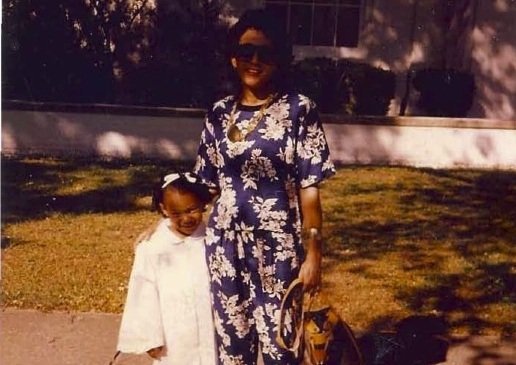Nadrea and Regina—Kindergarten Graduation, 1986
Nadrea R. Njoku is an artist, thought leader, and scholar deeply committed to producing critical and thought-provoking research, developing ideas and programming that is relevant to our time, advocating for historically marginalized populations, and strategizing for the improvement of organizations and institutions that assist us in moving culture and access to opportunities for those populations forward. Throughout her 15 years in the higher education and non-profit sector, she has come to believe that all industries have the tools to answer their most challenging problems; they have to remove institutional gatekeeping and look within for the possibility models toward success. She is committed to creating initiatives and thinking methodically about how centers for cultural exchange—museums, educational organizations, and foundations—can position their institutions to become benefactors for and support Black and Brown communities.
Born and raised in New Orleans, she observed firsthand the healing power the arts and education could play in supporting Black families through the impact of gun violence and impoverished communities. Her mother, Regina, immersed Nadrea in the culture of New Orleans, from festivals to second lines and community days at the New Orleans Museum of Art. While a childhood in the arts led to a bachelor's degree in fine art from Xavier University of Louisiana, her mother's experiences as an adult learner at a local historically Black college pushed Nadrea to pursue a Ph.D. in student affairs and higher education. Art remains her first love and the foundational lens through which she addresses our world's challenges, informing both her scholarly work and her approach to organizational transformation.
Educational Leadership and Research
Dr. Njoku's scholarly work centers on the intersection of education, cultural preservation, and institutional transformation. Her research methodology draws heavily from critical fabulation techniques, particularly in her exploration of how archives can be reimagined to center marginalized voices and experiences. This approach allows her to work with archival silences and gaps, creating space for speculative yet grounded narratives that honor the complexity of Black educational experiences and cultural heritage. Her educational research has focused on how historically Black colleges and universities (HBCUs) serve as repositories of cultural knowledge and community resilience. Through her scholarship, she has examined the ways these institutions navigate the tension between preserving tradition and adapting to contemporary challenges, always with an eye toward elevating their value proposition within higher education.
From 2019 to 2024, Nadrea served at UNCF in its Frederick D. Patterson Research Institute, culminating in her role as Assistant Vice President of the Patterson Institute. During her tenure, she led a staff of 10 researchers and, at a given time, 5 freelance editors, writers, and methodologists, elevating the value proposition of the HBCU community through thoughtful research, professional development of researchers, and community building. Her leadership resulted in doubling the size of the team, supporting emerging scholars through a fellows program, and raising more than 3.5 million dollars to support the capacity and research capabilities of the Patterson Institute. This experience provided invaluable insights into institutional leadership, strategic fundraising, and the power of research to drive organizational transformation—knowledge that now informs her approach to learning and management consulting.
Her work at UNCF also deepened her understanding of how research and data can be leveraged to support historically marginalized institutions, an experience that proved instrumental in shaping her current focus on helping organizations identify and implement their own possibility models for success.
Art Practice and Arts-Based Research
As a practicing artist with a fine arts background, Nadrea employs critical fabulation to explore her own Creole New Orleans heritage and the broader narratives of Black Southern families whose stories exist in the margins of official archives. Her artistic practice involves working with fragmentary evidence—family photographs, parish records, oral histories—to create layered visual narratives that acknowledge both what is documented and what must be imagined.
Her studio work encompasses mixed media installations, speculative portraiture, and textile works that incorporate traditional Creole techniques with contemporary materials. Through her art, she creates speculative reconstructions of ancestral lives, working respectfully with archival silences while remaining grounded in historical context. Her pieces often feature domestic archaeology—focusing on everyday objects, foodways, and cultural practices that might not appear in official records but were central to Creole cultural transmission.
Her ongoing projects, including the NOLA Black Girlhood Project, use arts-based research methodologies to excavate and celebrate the experiences of Black women and girls in cultural and educational spaces. These projects demonstrate how critical fabulation can serve as both artistic methodology and scholarly inquiry, creating work that functions as personal healing practice and broader cultural intervention. Her artistic approach to archives challenges traditional documentation methods, instead creating space for multilingual narratives, religious syncretism, and the complex economic networks that defined historical Creole communities.
Today, Nadrea channels her experience as an artist, researcher, and community builder into her learning and management business, helping organizations remove gatekeeping practices while discovering internal resources for sustainable success. Her approach combines rigorous research with creative problem-solving, centering historically marginalized communities.
She maintains an active studio practice, creating installations exploring cultural memory and community resilience. Her artistic projects serve as research laboratories for organizational work, testing methodologies for engaging institutional silences and developing inclusive storytelling frameworks.
Although New Orleans remains home, Nadrea lives in Atlanta with her husband and two sons, dreaming of providing them culturally immersive experiences while drawing inspiration from museums worldwide.
